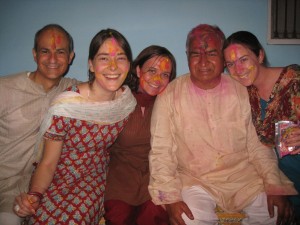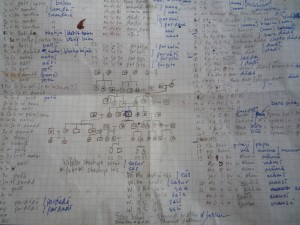Coming of age in my Indian family
Even before I became a part of his family, I often thought of my Hindi teacher, Virendra-ji, as my grandfather, simply because the two reminded me so much of each other. Both have dedicated their lives to the service of others through their respective ministries–Virendra-ji in the classroom and my grandfather in the church. They are men of strong and practical tastes, and shy away from anything that resembles indulgence or flattery.
Once, Virendra-ji’s daughters decided to have a chair custom made for him to relax in after his long days of teaching. The result, a latticed wooden rocker, was classic and tasteful. I saw him use it once or twice while his daughters were around, but during class one day he confided to me that he didn’t feel comfortable in it. He did not understand what need he could have for such a chair, which to his eye was better suited for a maharaja.
I had been Virendra-ji’s student four years earlier when I was in Banaras studying abroad. Our relationship, while mostly one of mutual respect and enjoyment, had not been without its clashes. What he offered to his students was both rigorous language instruction, and a genuine, warm, and yes, grandfatherly, concern for their well-being. After a forty-year career, he had very strong opinions about how to best manage both tasks. He expected us to try to adopt all the markers of Banaras life–dress, mannerisms, tastes, and knowledge suitable to the local environs–so we would be as proper as the Hindi he taught. I had some conflicting ideas about what was right for me, and sometimes found his stubbornness infuriating–all the more so because his approval meant a great deal to me.
When I returned to Banaras, I procrastinated on going to visit him. I had forgotten nearly all of my Hindi, and I was still settling back into banarasipan, that special way of being that characterized life in the city. I didn’t want to disappoint him. When I finally mustered the courage to drop by, all my worries disappeared. I was incredibly happy to see him again. His dress, like his home, was casual and endearing: his impressive belly pushed against his worn-in kurta and he wore a pair of faded white sneakers bearing the UW-Madison badger mascot. As always, his hair was thinning and silver, his eyebrows bushy and dark, and his smile warm and youthful. He invited me to stay for dinner and we set a time to begin classes again the following week.
His oldest daughter Annu-ji, also a Hindi teacher, was in town visiting from Mumbai and sat in on our classes to shadow her father. Whenever Virendra-ji would leave the room, Annu-ji would try to continue where her father had left off. But we would inevitably lapse into conversation, which, although in Hindi, was usually a little too casual to be called a lesson. Whenever she wasn’t in class with us, I hoped to run into her afterwards, which I often did, sometimes staying for an hour or more to talk. In between classes, her father would pass us on his way to get a cup of chai or a snack. He seemed pleased that we had become friends. Though Annu-ji was not much older than me, I also added the honorific suffix “ji” to her name, presuming this was the appropriate way to refer to someone who was both my occasional teacher and a part of Virendra-ji‘s family.
One day in class during a break between grammar structures Annu-ji asked what was in the shopping bag I had with me. “A sari. It’s a gift for Mrs. Goswami-ji,” I said. The Goswami’s were the Bengali couple who I was staying with and with whom I had become quite close. They were also friends of Virendra-ji’s family.
“What do you call her?” Virendra-ji asked.
I looked at him to make sure I’d heard him correctly. “Mrs. Goswami-ji,“ I said. What was he getting at? I didn’t know her first name, nor did I like the idea of using it.
“No, no, that doesn’t seem right at all,” said Virendra-ji, shaking his head. “You are more than just a guest in her home. It will be better for you to call her something else.” Annu-ji agreed that Mrs. Goswami-ji was too impersonal.
“What should I call her instead?” I asked.
Virendra-ji offered three alternate family names: Auntie-ji, mohsimaa, or bhabi. Auntie I knew; mohsimaa meant aunt on my mother’s side in Bengali, and bhabi was the Hindi word for older brother’s wife. Each seemed awfully specific to me, but Virendra-ji insisted that in this context their differences were irrelevant. Any one of them would indicate that I held her with both affection and respect. “But don’t just start calling her something else. You must ask her what she would prefer,” he said. He directed me to say that someone had told me that it wasn’t good for me to call her Mrs. Goswami-ji, and then ask her to please tell me whether I should call her Auntie-ji, mohsimaa, bhabi, or Mrs. Goswami-ji, in that exact order. She would politely say that it was my choice to call her whatever I wanted. I had to insist–“Please, tell me whether…”–and repeat the list over again. Then I could hope for an answer.
At the prompting of Virendra-ji, I recorded his directions in my class notebook and began to rehearse my lines. I looked over at Annu-ji, wondering if she might be able to help me make sense of it all. But she simply nodded her head encouragingly, clearly in agreement with her father on the prescribed method to correct the error of my ways. When I got home and approached Mrs. Goswami-ji, the conversation went word for word as Virendra-ji had predicted. It was as though he had planned the whole thing. I asked; she protested; I pleaded; she gave in. I was to call her Auntie-ji. Up until then, I had been Janna to her. But when she knocked on my door that night to say dinner was ready, she called me beti–daughter.
It felt like some kind of mating ritual, as though after a few dates and epic late-night phone calls I’d asked her to go steady. Certainly, she’d done her part by playing just the right amount of coy. Though I was touched by her reciprocation, and grateful for the help Virendra-ji and Annu-ji had given me in taking this next step in my relationship, I couldn’t quite grasp what it all meant. Still, it was clear that this wasn’t one of Virendra-ji’s out-of-fashion ideas about the right way to do things. Quite the opposite. Names were just more loaded here; it wasn’t a mere matter of vocabulary. These terms had larger cultural context and meaning, each tied to the set of proper behaviors that befitted them. I felt like I’d passed a test. If Virendra-ji, ever critical and appraising of how I carried myself, thought my relationship with Auntie-ji was worthy of the name, I must have done something right, even if I didn’t know quite what.
The next day I reported back what had happened to Virendra-ji and Annu-ji. They were relieved. After class, I stayed on chatting with Annu-ji’s mother. As we talked, I realized that I had never heard her call her husband anything except Guru-ji, the term of respect for any important teacher. I had never thought to call him anything but Virendra-ji; indeed, I had never heard him called by any other name until I started coming to his home. There was no doubt that everyone had taken note of the fact that I didn’t call him Guru-ji; but up until now, I‘d never considered that I should.
I certainly felt the deference and loyalty to him that I associated with the idea of a guru, but what of the protocol? I imagined that if I asked him directly whether I could call him Guru-ji, he might say no, either out of humility, or perhaps because he would find the sentiment, so many years into our relationship, disingenuous. One thing was for sure: he and Annu-ji weren’t going to walk me through my lines this time.
My classes continued. Mixed in with grammar drills and new vocabulary, Virendra-ji and I had begun to chat more. He knew what pieces I was working on, the concerts I‘d attended, that I liked my chai extra-sweet and my coffee black. I knew what games he played with his granddaughter, that he didn‘t watch cricket because it was bad for his heart, when he was planning to retire (never). I was also spending more and more time at the house, helping Annu-ji pick the leaves off of huge bundles of cilantro to be used in a chutney and sympathizing with her mother’s outrage at the rising price of gold. I loved spending time with the entire family and didn’t want to do anything to jeopardize the relationship. I did my best to avoid referring to anyone by name, waiting for a sign of what to do.
One afternoon after finishing class I found Annu-ji sitting in the hallway. Her mother was lying down on a nearby couch looking overtired and uncomfortable. “Do you know what happened?” Annu-ji motioned to her mother with admonishing eyes. “She was out working in the garden for over an hour, and now her back hurts. It happens every time. I keep telling her to give it up but she won’t listen.”
I nodded noncommittally, more to indicate that I’d understood her Hindi than to pass any judgment on her mother’s hobby. “Janna, tell her to stop,” Annu-ji said.
I raised my hands to my chest with my palms faced outwards and shook my head slightly. “I don’t think it’s my business,” I said. Maybe I didn’t know the right respectful term to call her mother, but I was pretty sure it wasn’t my place, at forty years her junior, to tell her what to do.
Annu-ji looked at me incredulously. “Don’t be silly. You’re family. Of course it’s your business. Tell her.” Her mother waited to see whose side I would take.
“She’s right,” I began. I realized there was only one argument to be made, and only one way to make it. “If you’re healthy, then Guru-ji is happy. And if Guru-ji is happy, everyone is happy.” Annu-ji smiled wide and satisfied. Her mother grunted, unable to protest my logic.
A few days before Annu-ji was to return to Mumbai, I told her how happy I was to have met her and asked if I could call her didi, older sister. She told me she understood why I had asked, but that she would feel closer to me if I just called her Annu. Of course. Though she had been my teacher, she was now my friend, and my equal. Our given names were terms of endearment enough.
Her mother became another Auntie-ji. As for Guru-ji, I never called him anything else again. There was no turning back, not from the name, or from the responsibilities that came along with it. The new title–which arose as much from my relationship with Annu and Auntie-ji as from my role as his student–elevated him higher, but it also brought me closer. I had been initiated into another tutelage, that of this culture, this family. Surely I was more answerable to Guru-ji’s expectations than ever before. I couldn’t have been happier for it.
It was time to leave Banaras. At the end of our last class, I gave Guru-ji a letter: three carefully crafted paragraphs of Hindi, expressing my gratitude for all he and his family had taught me. I was sure it contained some mistakes, but for once, he didn’t correct them. For the moment, what mattered more was that other, familial fluency.
—
This story was originally published on Glimpse.org on 16 August 2010.









One Comment
I really love this piece! It’s a wonderful tribute to Virendra-ji and his family, and vivid testimony of how much you learned from him. Thank you for sharing.